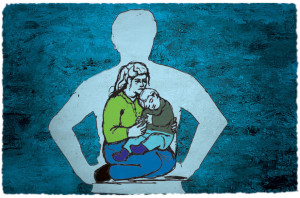I’ve seen the claim that most states allow rapists custody rights to children they fathered through rape. In this context I wasn’t sure whether “rapists” meant men found guilty of rape or men accused of rape. Apparently it is the former. According to the recently introduced Rape Survivor Child Custody Act:
Currently only 6 States have statutes allowing rape survivors to petition for the termination of parental rights of the rapist based on clear and convincing evidence that the child was conceived through rape.
This CNN article discusses the estimated tens of thousands of pregnancies that result from rape each year in the US. The article claims about two thirds of these pregnancies are terminated, which still means thousands of rape victims choosing to carry to term each year.
These women should not have to fear being tethered to their attackers for the first 18 years of their children’s lives.Removing a rapist’s parental rights seems to be the obvious choice for women’s rights advocates, as well as people on both sides of the abortion debate; neither pro-lifers nor pro-choicers want women to feel coerced into getting abortions.
If we were talking about taking away parental rights from men accused of but not found guilty of rape, I think there would be a significant concern that such legislation could take away parental rights from innocent men. However, if the legislation only applies to cases involving “clear and convincing evidence” of rape, what could be the arguments against such legislation?

“Clear and convincing” evidence is just one standard of evidence. You have everything from probable cause to beyond reasonable doubt with at least three or four different levels of proof in between. What is the statutory standard of evidence required to convict a rapist in those states? If the standard of evidence required to convict a rapist is beyond reasonable doubt, and if those six states require clear and convincing evidence under this new statute, then a father’s parental rights could potentially be severed without an actual finding that he’s criminally guilty of rape. I’m not sure if that’s the case, though.
As a paralegal, I’ve helped defend a woman whose parental rights were being threatened. The courts are extremely reluctant to sever parental rights, and with good reason. The right to raise your child is one of the most fundamental of them all, and the state is not in the business of determining who is worthy to be or not to be a parent. Even convicted felons can have limited visitation rights.
The potential problem with the laws in question is the paradigm shift it introduces. Any time the court is dealing with the child, it is obligated to do what is in the best interest of the child first and foremost. The child’s well being is paramount and takes priority over the rights of other parties. The way this blog post tells it, the laws in those 6 states don’t look at it that way; the parental rights are beings severed to protect the mother, not the child.
Granted, it very well could be that it’s not in the best interest of the child to have contact with the man who (under some level of evidence) raped his or her mother, in which case, the courts might sever rights or limit contact and/or custody based on that finding, and my guess is that happens fairly often even in the other 44 states. It doesn’t necessarily have to be spelled out in statute to be put into practice. As sympathetic as I am to a woman in this predicament, parental rights should only be severed when there is a genuine threat to the child, not as a punishment for past sins. I have absolutely no problem, however, with courts factoring in evidence of a past history of abuse/rape when making findings about the child’s well being, custody, and parental contact.
Thanks for all your good points.
What are the different levels of proof in between probable cause and beyond a reasonable doubt? Where does “clear and convincing” evidence fit in?
I agree that the right to raise your own child is fundamental, and should be curtailed with great hesitation. However I’m not sure I agree that the state isn’t in the business of determining who is worthy to be a parent. Doesn’t just the fact that terminating parental rights is possible suggest otherwise?
You make a very good point about the shift these laws introduce, as far as focusing on the well being of the mother perhaps more than that of the child. I intend to think on that more.
However I’m not convinced the motive of the law is to punish rapists so much as to protect rape victims. I don’t see those as the same thing.